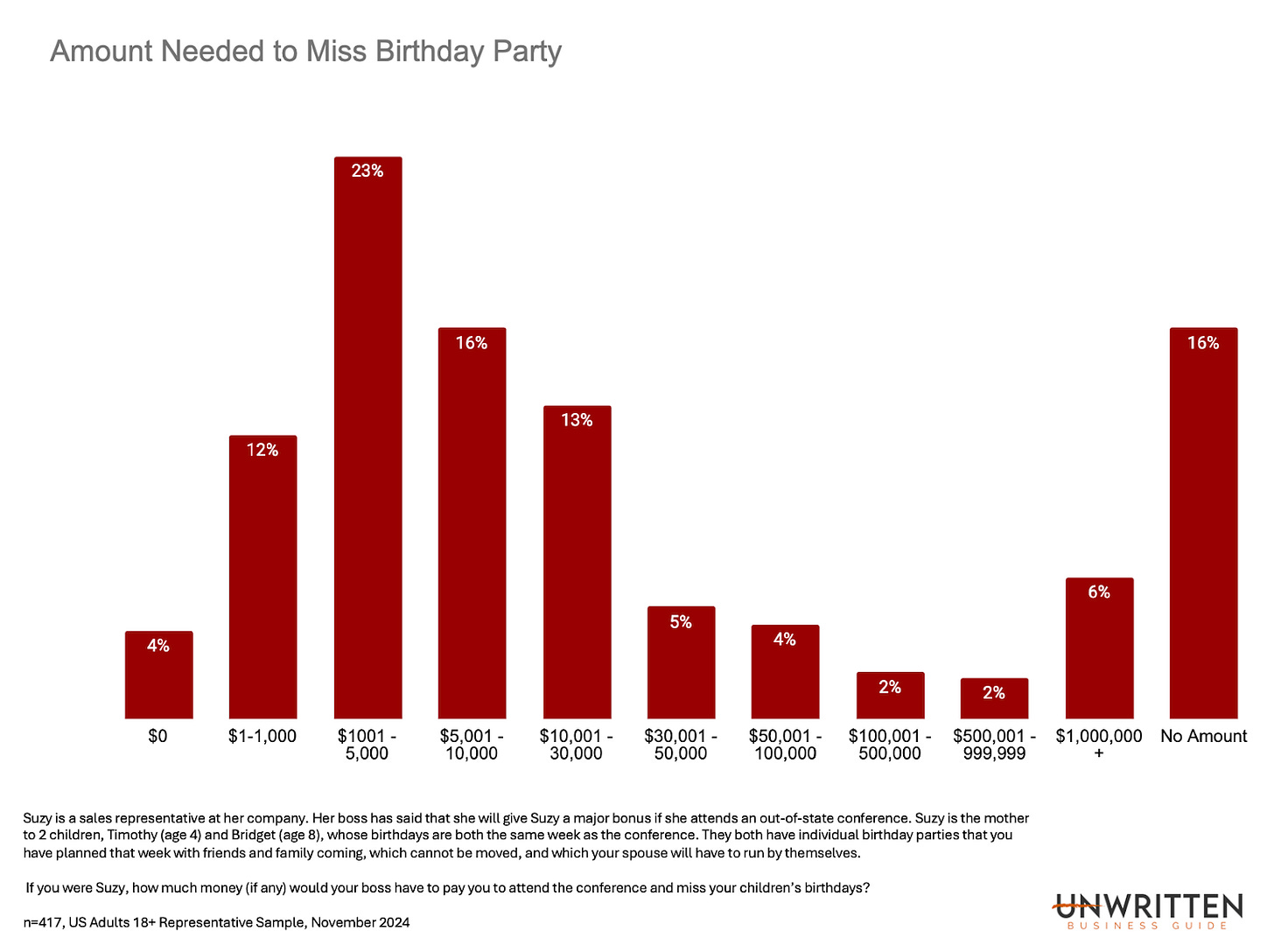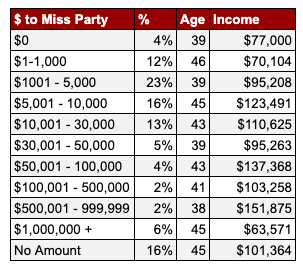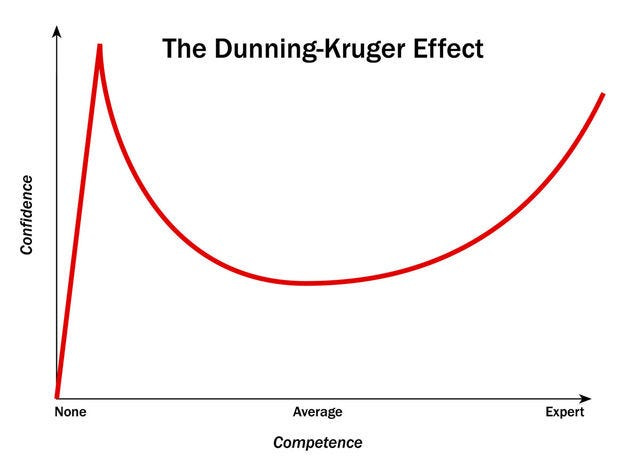The average American would need to be paid $79,680 to miss their child’s birthday. Outside of these people willing to trade off money for a birthday, 1 in 7 Americans wouldn’t take ANY amount of money to miss their child’s party.
This begs a myriad of interesting questions:
- Is there any correlation between your demographics and your choice?
- What is the tradeoff between dollars and a once-in-a-lifetime experience?
- What’s our stated amount versus what would we actually take?
Here’s the scenario we asked for a representative sample in the United States recently:
Suzy is a sales representative at her company. Her boss has said that she will give Suzy a major bonus if she attends an out-of-state conference. Suzy is the mother to 2 children, Timothy (age 4) and Bridget (age 8), whose birthdays are both the same week as the conference. They both have individual birthday parties that you have planned that week with friends and family coming, which cannot be moved, and which your spouse will have to run by themselves.
If you were Suzy, how much money (if any) would your boss have to pay you to attend the conference and miss your children’s birthdays?
Let’s take a look at the results:
The Average American Needs Big $$$ to Miss a Party

Note that while the average is $78,980, which is the total of all amounts divided by the count, the median amount is $10,000, which is the middle between all respondents.
Put another way, when compared to the average household income of $80,610, people would basically need a full year’s salary to forego a party, and the median household would need over 6 weeks’ pay.
When sliced by every demographic indicator, we found no correlation between these factors and one’s choice. This includes education received, employment status, age, gender, ethnicity, income, marital status, or even children in the home. Here’s a snippet to show how varied it is:

Probably most interesting were the people willing to go to the conference for free ($0). Many of these respondents stated that this is just part of having to work. One of our favorite responses though was someone that said “I hate birthday parties, so I’d go for free.”
Another fascinating category are those who wouldn’t go for any amount (16%). Many of these responses stated they wouldn’t miss it for anything. Some discussed having near death experiences that put their life into perspective, losing a parent and seeing how precious time is, or just reiterating their family values.
Cost vs Reward: How to Quantify For Everyday Scenarios
- When you get booked in an 8am meeting and this means you can’t drive your kids to school
- You are working the night before on a big presentation instead of spending time with your spouse
- Having lunch with coworkers instead of lunch with your brother
While seemingly harmless at the moment these choices can add up over time (for both good and bad). For example, if you never drive your kids to school they may grow up thinking that you like working more than spending time with them. Conversely if you choose to miss the 8am meeting every week you may miss critical information which makes you worse at your job.
The question you can ask yourself when faced with a tradeoff, however small, is “What is my opportunity cost?”
For us to determine opportunity cost it helps to quantify it, similar to the birthday party scenario. You may realize that by attending the conference there is no way it would ever add up to the loss you would experience by missing the party. But if the cost is worth it to you (e.g., by attending this conference, I’ll make enough sales to get to the next commission level, which will earn my family an extra $50k this year) then you should attend the conference.
We have found in doing this exercise, though, that the cost of doing extra work is rarely worth it. Instead, we have found creative solutions to help us achieve better harmony between our work and family lives. That conference? Go to the next one. That 8am meeting? Ask for it to be moved to 9am.
While balance between work and family life is all but impossible to achieve, one can find harmony between the two if you’re willing to be creative.
I Would Need a Million Dollars! But Would You?
Let’s suppose you’re part of the 6% of people who need a million dollars to miss the party. One. Million. Dollars. That’s a lot of money.
Would if you were offered $950,000? That could buy a new house in most markets, with money left over for an epic family trip and a new car.
How about $800,000? That’s over 10x the median household income in the U.S. That would mean not needing to work for 10 years!
As you can see, this ratchets down pretty quickly. There’s something in psychology called the Dunning-Kruger Effect, where people overstate their own capabilities or willingness to do certain tasks. This matters when you’re trying to make tradeoffs between decisions. You may say “I would never miss a child’s birthday party!” but when given a hard tradeoff you may buckle.

This matters because you need to decide today what’s truly, absolutely important to you. For me, to be at this point in my career I have made real sacrifices with my family time in order to accelerate my career (see Taking Traeger Public) or give me personal fulfillment (see Becoming a Professor). My opportunity cost of missing these career experiences actually outweighs family time.
However, I also have relentlessly worked to find harmony between my family, personal, and work lives (see A Real Day of a Marketing VP, Professor, Husband, and Father of 4 Young Children). The harmony isn’t perfect, but it works for my family as we also value the benefits of my job and the fact that I’m just happier when I can run a marathon once in a while. I won’t overstate how great I am in any one part of my life since the truth is, according to the Dunning-Kruger Effect, that I’m at best average.
The whole point here is to choose what’s negotiable and what’s non-negotiable. Here’s some non-negotiables for me:
- Religious worship, which includes scripture study, attending church, and paying tithing
- Time with my wife, which includes daily interactions and constantly dating
- Time with my kids, which includes regular one-on-one interactions
- Daily exercise, which helps me be my best self mentally and physically
- Doing my best work, since everything I do has my name on it
For example, by having these non-negotables I can know what I’m willing to trade off. In grad school I would often work on homework and projects all evening Friday and most of the day Saturday just so I could have Sunday for religious worship. Some evenings I’ll be up late talking with my wife and still set my alarm for 5am to get in a good run in before work. Again this works for me, and you may have drastically different non-negotiables, and that’s the beauty of this model.
Conclusion
Whether you’d be willing to miss the child’s birthday for next to nothing (“I hate parties”) or a million dollars (“hello new house!), we all must wrestle with difficult tradeoffs. These are often more subtle than this diabolical scenario but our everyday decisions will shape who we become.
As long as you have a solid value framework in place it will empower you to make these decisions and be able to sleep at night as a result. Remember, you’re likely overconfident in our ability to make these decisions and should be realistic with where you draw the line. By constantly seeking harmony between work, family, and personal endeavors you will find happiness in your decisions.
Or if you just hate parties then these decisions should be easy!


